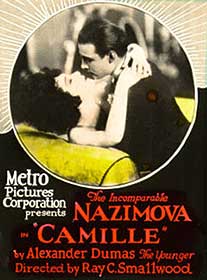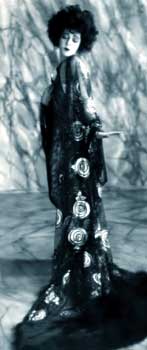 The silent film, Camille (1921) is loosely based on the novel Lady of the Camelias (1852) by Alexander Dumas fils (1824-1895), bastard son of the author of the Muskateers novels. The silent film, Camille (1921) is loosely based on the novel Lady of the Camelias (1852) by Alexander Dumas fils (1824-1895), bastard son of the author of the Muskateers novels.
Dumas the younger based his book on an actual courtesan well known to himself, Marie Duplessis, who died young of tuberculosis (perhaps in actuality venereal disease) in 1847. Dumas also wrote a play based on his own novel produced in America as Camille.
The film additionally takes some of its cues from Manon Lescaut (1731) by Francois Antoine Prevost, but transposes the characters to the modern generation of 1920s Paris.
There are, however, flashbacks in Camille to the main characters' earlier incarnations as Prevost's tragic bannished prostitute & her devoted lover, providing the opportunity of seeing Rudolph Valentino in powdered wig -- an opportunity the public disliked because Valentino already seemed light in the loafers without King Louis drag.
The first most obvious appeal of Camille (1921) is the art nouveau costumes & sets. Greatly influenced by Aubrey Beardsley, the art design is the work of Natasha Rambova, domineering wife of Valentino, & the designer also for the "all-gay-Hollywood" production of Oscar Wilde's Salome (1924) starring her lover Alla Nazimova, the star also of Camille.
Armand (Valentino) is a naif from the provinces. He has just arrived in Paris & is agog over the glory of all things, though his boyhood friend Gaston (Rex Cherryman) has been in the city longer & has grown blase. These young handsome gents make the [;easomg couple arriving at a big event together.
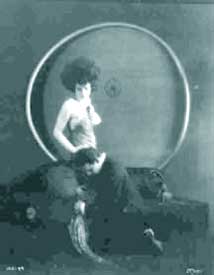 The Lady of Camellias is Marguerite Gautier, played by Nazimova. She is "a useless ornament, a plaything, a momentary aurora." Naive Armand is eager to be introduced to her, though what chance has a poor law student with the season's most popular odelisk, presently on the arm of an old Count who picks up the entire tab for his mistress's considerable entoirage or hangers-on. The Lady of Camellias is Marguerite Gautier, played by Nazimova. She is "a useless ornament, a plaything, a momentary aurora." Naive Armand is eager to be introduced to her, though what chance has a poor law student with the season's most popular odelisk, presently on the arm of an old Count who picks up the entire tab for his mistress's considerable entoirage or hangers-on.
Partying about Paris one would never know she suffers when alone in the art nouveau paradise of her bedroom. She hides a great unhappiness & sometimes cannot suppress tubercular coughing fits. But in the company of wealthy or decadent Parisians, she is always a delight, offering her favors to whoever "puts a jewel in my hand."
Nichette (Patsy Ruth Miller) is an innocent little dressmaker who Marguerite adores, fawning on the sweet girl obviously admiring her simple manners & obviously regarding her own life as inferior to Nichette's. But soon she leaps back into her popular persona dancing & singing for her patrons & admirers.
Idiotic Armand pines & pines for the delightful Marguerite. "This life is beneath you!" he protests. "It is killing you!" She warns him, "You know what I am," but he begs her to let him prove his devotion & let him nurse her (as Cartman on South Park would surely note, "That's so gay").
The Count gets peevish to find his paid-for companion in the arms of a young spunk from the provinces. When he gets spiteful, she kicks him out, shuts down the party, & collapses miserable on a divan with only Armand to provide succor.
The law student cares for her like a nursemaid & over the months her lungs improve. On the countryside in spring, they are leading a much more wholesome life than she had previously known. But she worries that she is doing the wrong thing in permitting him to chain his reputation to her past & she has had a presentiment of doom if they remain together, symbolized by the heroine & hero of the little book by Prevost which Armand has given her.
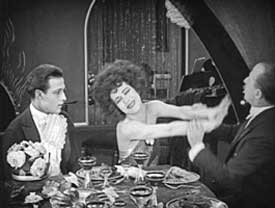 Her friend Nichette has meanwhile fallen for Armand's friend & they are engaged to wed. It inspires Armand to ask Marguerite to marry him, & she dares to dream it is possible, despite her presentiment. Her friend Nichette has meanwhile fallen for Armand's friend & they are engaged to wed. It inspires Armand to ask Marguerite to marry him, & she dares to dream it is possible, despite her presentiment.
Marguerite has a much older rather ugly sister, Prudence (Zeffie Tilbury), who has clung to her sister's popularity & might happily sabotage Marguerite's intention of abandoning the luxurious life of a Parisian odelisk. And then Armand Duval's father (William Orlamand) arrives, insisting Marguerite not continue to destroy his son's reputation, awakening all her guilt for former life.
She begs her lover's father not to make her give up his son. "He is my life! And I have not long to live!" Her brief idyll descends into tragedy, as she thinks again of that earlier life in Prevost's novel. She believes she must make Armand hate her or otherwise she will have chained him to her past rendering him unable to claim his greater destiny.
By the following autumn, the currency of the Lady of the Camellias had been supplanted by the charms of a new odelisk, Olympe (Consuelo Flowerton), & her beau is the gambling dandy -- Armand. "He's only doing it so that Marguerite will hear of it," says his old friend Gaston.
In his bitterness, he does all he can to humiliate her publicly. Her always poor health weakens dramatically in consequence. Bedridden, her flamboyant career is done, & death is near. The misery of the occasion breaks even the heart of Armand's callous father for his role in what must forever be his own son's unhappiness.
It's the last day of December; snow falls; & the Count she formerly relied on has provided only for the auctioning of everything in her apartment. Even her deathbed will be sold from beneath her failing body.
Sound sad? Well, she's a hooker after all, & death is the only reasonable punishment even for hookers with hearts of gold. But to be fair, the story carries Dumas the Younger's sentimentality born of his own ill-fated mother, the mistress of the elder Dumas, & the younger Dumas' intent was to awaken public awareness of injustices perpetuated by men against women they would make mistresses instead of wives, & children they would leave as stigmatized bastards.
Despite moments of overacting common to silent films, this is an excellent film transcending melodrama & seeming a beautiful tragedy, a brilliant piece of storytelling framed by those artful sets. And Nazimova certainly does dominate the screen, her singular honesty in the role probably born of her own similarly flamboyant party life.
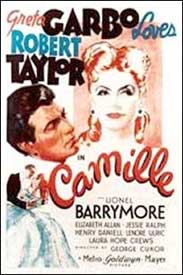 Marguerite Gautier, the Lady of Camelias, is played by Greta Garbo in the important 1936 remake also starring Robert Taylor as Armand Duval, Rex O'Malley as his best friend Gaston, Lionel Barrymore as Armand's father, & Henry Danielle as the Baron de Varville.
Marguerite Gautier, the Lady of Camelias, is played by Greta Garbo in the important 1936 remake also starring Robert Taylor as Armand Duval, Rex O'Malley as his best friend Gaston, Lionel Barrymore as Armand's father, & Henry Danielle as the Baron de Varville.
Unlike in the silent version, you have to pay awfully close attention to detect that Camille is a prostitute. She's for the most part played as a "mere" libertine circa 1847 whose bad reputation is that she parties too much.
Garbo creates a marvelous portrait of the sophisticated Marguerite with her pretence of lightheartedness, for whom no happy ending is possible if only because she's tubercular.
Armand pursues her single-mindedly & she does finally leave the Paris with him for a long idyll on the countryside. The baron who once supported her has a castle estate nearby, & Armand has bouts of jealousy without cause. In the main, however, they get along famously, & Armand is even willing to risk everything taking her for his wife.
But Armand's father talks her out of allowing his son to ruin his life over her. They can't honestly expect to be married given her past life, & their love will not flourish without social & religious buttresses.
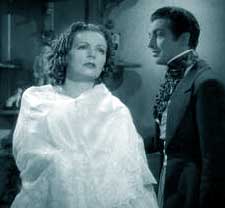 She caves in to his arguments & preys upon Armand's tendency to jealousy to make him bitterly despise her, as otherwise he would never give her up. She caves in to his arguments & preys upon Armand's tendency to jealousy to make him bitterly despise her, as otherwise he would never give her up.
The sequence in which Armand wins piles of money at the gambling table while the baron loses, & then throws the money at the "harlot" so no one can clain he ever accepted goods without payment, is Taylor's best moment in the film.
It's followed by a nice little duelling sequence between Armand & the baron. The baron is wounded, & Armand must leave France to avoid arrest.
He returns months later to discover Marguerite has not, as he expected, returned to her old life, but has lived in seclusion, & is now bedridden & alone, selling off her possessions one by one to get by.
Bedridden with consumption, creditors perch like vultures to claim all that remains of her possessions even before she is dead. She has refused to see the baron or anyone else who might have helped her, but clings to life only for a last reunion with Armand.
Garbo is spectacular in her performance. It's not her character design because she wears horrendous costumes that would be better suited to Victorian dollies, & she's afflicted with a Shirley Temple hair-do to match. It doesn't matter; she can scarsely make a physical movement that falls short of a dancer's poetry, & every time she speaks there is subtle emotive power from lighthearted dismissiveness to intense pain & sorrow.
Taylor is more than adequate & terribly romantic in his part, but just not Garbo's equal in front of the camera. So we don't score two shockingly tremendous roles like those of Merle Oberon & Lawrence Olivier in Wuthering Heights (1939), but it's no less a classic.
copyright © by Paghat the Ratgirl
|
